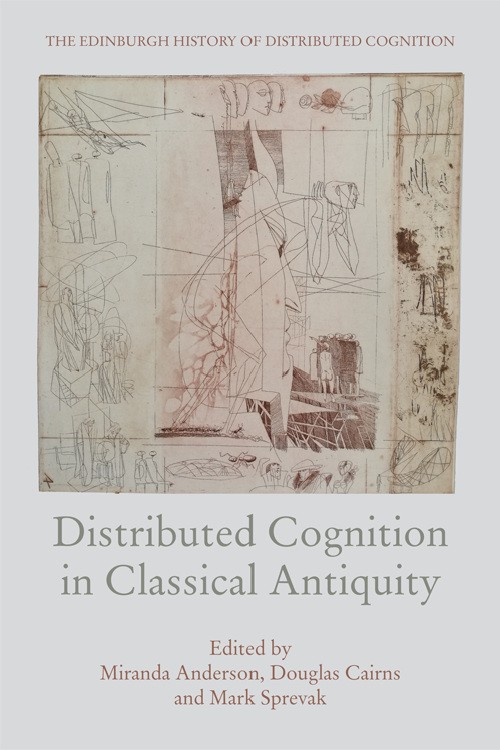Distributed Cognition in Classical Antiquity
(with Miranda Anderson & Douglas Cairns)
2018 Edinburgh University Press: Edinburgh, 304 pp.
Last updated 22 October 2018

An opening essay outlining the theoretical framework along with twelve essays by international specialists in classical antiquity create a period-specific interdisciplinary introduction to distributed cognition and the cognitive humanities. This collection explores how cognition is explicitly or implicitly conceived of as distributed across brain, body and world in Greek and Roman technology, science, medicine, material culture, philosophy, and literary studies.
A range of models emerge, which vary both in terms of whether cognition is just embodied or involves tools or objects in the world. As many of the texts and practices discussed have influenced Western European society and culture, this collection reveals the historical foundations of our theoretical and practical attempts to comprehend the distributed nature of human cognition.
- The first book in an ambitious four-volume set looking at distributed cognition in the history of thought.
- Includes essays on archaeology, art history, rhetoric, literature, philosophy, science, medicine and technology.
- For students and scholars in classics, cognitive humanities, philosophy of mind and ancient philosophy.
- Includes essays by international specialists in classics, ancient history and archaeology.
Reviews
Once we look for it, distributed cognition is ubiquitous in classical antiquity. This book offers a fascinating examination of the tools that made thinking easier and of the complex boundaries between the individual mind and the group.
– Professor Ruth Scodel, University of Michigan
This is a fascinating volume that often reveals surprising analogies between contemporary accounts of distributed cognition and the view of several Classical thinkers. It refreshingly goes beyond the contemporary focus on cognition as computation to consider the many ways in which body and world scaffold our psychic life, including its affective and conscious dimensions.
– Professor Giovanna Colombetti, University of Exeter
Contents
Introduction: Distributed cognition and the classics – Douglas Cairns
Physical sciences: Ptolemy’s extended mind – Courtney Roby
Distributed cognition and the diffusion of information technologies in the Roman world – Andrew Riggsby
Mask as mind tool: A methodology of material engagement – Peter Meineck
Embodied, extended and distributed cognition in Roman technical practice – William Short
Roman-period theatres as distributed cognitive micro-ecologies – Diana Y. Ng
Cognition, emotions and the feeling body in the Hippocratic corpus – George Kazantidis
Enactivism and embodied cognition in Stoicism and Plato’s Timaeus – Christopher Gill
Enargeia, enactivism and the Ancient readerly imagination – Luuk Huitink
Group minds in Classical Athens? Chorus and dēmos as case studies of collective cognition – Felix Budelmann
One soul in two bodies: Distributed cognition and Ancient Greek friendship – David Konstan
Distributed cognition and its discontents: Three episodes from the Classical tradition – Thomas Habinek and Hector Reyes
